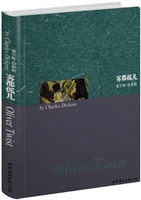啃嚼語(yǔ)段
Oliver wondered why the old man lived in such an old, dirty place, when he had so many watches, but then he thought that it must cost Fagin a lot of money to look after the Dodger and the other boys.
奧利弗很納悶,這老頭有那么多金表,他為什么還住在這么陳舊、破爛的地方;不過(guò),然后他又想,他養(yǎng)活神偷和其他的孩子們肯定也得花去許多錢。
So he said nothing,and got up and washed.When he turned towards Fagin, the box had disappeared.Soon the Dodger entered with a cheerful young man named Charley Bates.
因此他什么也沒(méi)說(shuō),就起身去洗臉了,當(dāng)他再轉(zhuǎn)身看費(fèi)金時(shí),那只盒子已經(jīng)不見了。 不一會(huì)兒,神偷和一個(gè)叫查理·貝茨的樂(lè)呵呵的年輕人走了進(jìn)來(lái)。
"Have you been at work this morning?"Fagin asked the Dodger.
“今兒上午你們工作了嗎?”費(fèi)金問(wèn)神偷。
"Hard at work,"answered the Dodger.
“干得很賣勁。”神偷回答說(shuō)。
"Good boys, good boys!"said Fagin."What have you got?"
“好孩子,好孩子!”費(fèi)金說(shuō),“你們都弄到什么了?”
"A couple of pocket-books and some handkerchieves."
“幾個(gè)皮夾子和幾條手帕。”
"Good workers, aren"t They, Oliver?" said the old man.
“他們是好工人,對(duì)不對(duì),奧利弗?”老頭說(shuō)。
"Very good," said Oliver.
“非常好。”奧利弗說(shuō)。
The others all started laughing, though Oliver saw nothing funny in his answer. Fagin inspected the handkerchieves and told the two boys that they were extremely well made and that he was very pleased with their work.
別人都笑了,可奧利弗并不覺(jué)得他的回答有什么好笑的。費(fèi)金查看過(guò)手帕,告訴兩個(gè)孩子這些手帕做工精美,并表示對(duì)他們的工作感到高興。
語(yǔ)段精講
1. Oliver wondered why the old man lived in such an old, dirty place, when he had so many watches, but then he thought that it must cost Fagin a lot of money to look after the Dodger and the other boys.
語(yǔ)法點(diǎn)撥:本句中的when是連詞,但是意思是“然而,可是”,不是“當(dāng)......時(shí)”。
寫作句式:Something costs sb some money. 某物花費(fèi)某人多少錢。e.g. The book cost me an arm and a leg. 這本書很貴,花了我一大筆錢。
短語(yǔ)精講:look after:照顧,照料 e.g. We should advertise for someone to look after the garden. 我們應(yīng)該登廣告來(lái)尋求一個(gè)人照料花園。Can you take and look after the children for a few days? 你能把小孩帶去照顧幾天嗎?
3. Soon the Dodger entered with a cheerful young man named Charley Bates.
語(yǔ)法點(diǎn)撥1:named Chartley Bates是過(guò)去分詞短語(yǔ)做后置定語(yǔ),修飾名詞man。
語(yǔ)法點(diǎn)撥2:a cheerful young man這個(gè)短語(yǔ)中有2個(gè)形容詞同時(shí)修飾man,cheerful是表示“神情”的形容詞,young是表示“年齡”的形容詞,這樣的話,表示神情的形容詞要放于表示年齡的形容詞前面。
4. Have you been at work this morning?
短語(yǔ)精講:at work:上班,工作 e.g. Some are hard at work and some are slack in work. 有的勤奮工作, 有的則消極怠工。He is still at work on the restoration. 他仍忙著做維修工作。
5. The others all started laughing, though Oliver saw nothing funny in his answer.
短語(yǔ)竄燒:the others:其他的人 start doing something:開始做某事
詞匯理解:see在這里的意思是“覺(jué)得,感覺(jué)”;介詞in在這里的意思是“在(某方面)”。
6. Fagin inspected the handkerchieves and told the two boys that they were extremely well made and that he was very pleased with their work.
詞匯精講:inspect:vt. 檢查 e.g. The customs officer inspected my passport suspiciously. 海關(guān)官員頗為懷疑地檢查了我的護(hù)照。
短語(yǔ)精講:be pleased with something:對(duì)......感到滿意 e.g. I should like to add that we are pleased with the result. 我想補(bǔ)充一句,我們對(duì)這個(gè)結(jié)果感到高興。I felt especially pleased with my wonderful bargain.我對(duì)自己的這筆巧妙的交易非常滿意。











